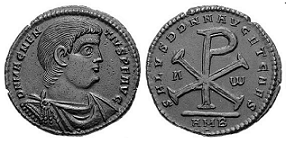Merry X-Mas?!
When I was a little girl in the 1950’s, I remember one of the stores in our small Georgia town having a sign outside that said “X-MAS SALE.” My mom hated that sign. She pointed it out every time we went shopping making sure we knew how terrible it was for “someone to take the ‘Christ’ out of Christmas.” Of course, my sisters and I agreed. So I was very surprised to find out years later from a history teacher in college what that “X” really stood for. Turns out the X isn’t an X at all but rather it’s the Greek letter “Chi” (X) which has the sound of our letter K. It also just happens to be the first letter in the Greek word for “Christ.” So the X is an initial, an abbreviation, for Christ and not an X-ing out at all. In fact, using the chi symbol to stand for Christ has a very long history. It goes back at least to the time of Constantine, the first Christian emperor of the Roman Empire. Upon his conversion to Christianity, he began using the symbols of both X (chi) and P (rho), the first two letters in the word “Christ,” to stand for his new faith. In the Catholic Church, the priest’s robe is decorated with the XP symbol at Christmas. Many Protestant churches have traditionally used the symbol as well, sometimes on their altar cloth or on the mantle of the pastor’s robe. So letting an X stand for Christ has been going on for a very long time–way before the 1950’s!
Admittedly, today is a different story. Christians are swimming against a tide of new and often fervent atheists and secularists who are, either figuratively or literally, attempting to take the “Christ” out of a lot more than just the word Christmas. Most of us are familiar with many of the modern battlefields, from courthouses where 100-year-old engraved copies of the Ten Commandments have had to be removed, to high school ball games where prayers “in Jesus name” are no longer allowed. At Christmas time the struggle becomes front stage and center because, of course, Christ is naturally right there at the heart of it all. He’s the babe in the manger, the inspiration for heavenly choirs of angels, “the reason for the season,” and the name that is and should remain smack in the forefront of what we as Christians have for centuries called this wonderful, mid-December holy day: Christmas–the celebration of the Christ Mass. Yet now we must put up with store clerks who will only say “happy holidays,” schools who let children out for “winter break,” and a deluge of media hype and advertising that is also sidestepping the forbidden word in favor of the same or similar bland holiday greetings. It’s as if they are all saying, “Whatever you do, don’t mention Christmas!” Everyone knows it’s all about Christmas, but they refuse to say it. Makes you feel crazy sometimes, doesn’t it?
So how should we respond to the attempts to de-Christianize Christmas, and more specifically, what should we do about this “X” business? If the X is Greek for the first letter of Christ, should we struggle against it? Well, whatever we say or do, it should be filled with grace and respect. Trying to get tired and overworked sales clerks to say “Merry Christmas” instead of “Happy Holidays” really isn’t the point, is it? Shouldn’t we just be patient and understanding, perhaps praying for them as we wait in line? ( If I were working retail at Christmas I’d need people praying for me!) Of course, whenever we do have the power or influence to change a sign, a brochure, or a banner, we should put the Christ back in Christmas. But whenever the situation is beyond our control, we can have fun enlightening people about the true origin of the X. We can teach our children that nothing has been X’ed out after all. In fact, the X is a witness to the very roots of Christianity itself, a testimony to the antiquity of our faith and to the death-defying efforts of the early Christians to get the message out. The first Christians were all Palestinian Jews living in Aramaic-speaking communities, yet they did not write down the gospel story in their own local native tongue. Why? Because they couldn’t rest until the whole world knew of a savior who had died for everyone. So they chose instead to write in the lingua franca, or trade language, of the Roman Empire, the language that the greatest number of people would be able to read and understand. They wrote in Greek. Thus we got the X for Christ.
So instead of fighting “X-Mas,” perhaps we should start a campaign among our fellow believers to use it every chance we get! Think of what a great conversation starter that could be. So here’s to putting Christ back into the “holiday season” and to wishing everyone a very merry X-Mas!
An early Roman coin showing the emperor on one side and on the other side the Greek letter X(chi) layered over the letter P(rho) on the back of the coin.

